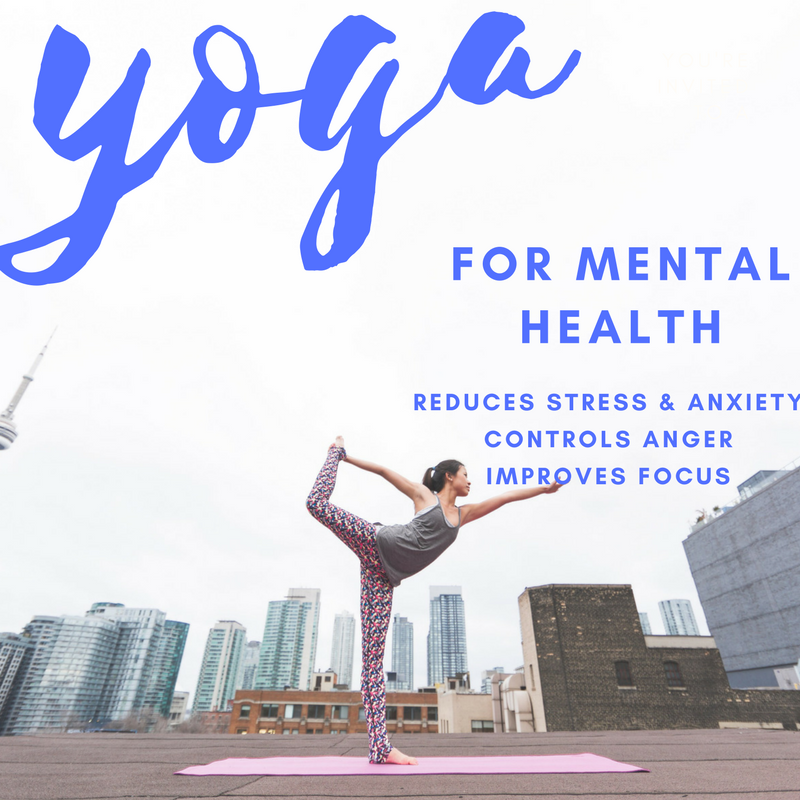
The Mental Health Benefits of Yoga: Is it true?
We’ve discussed yoga before and emphasized the physical and mental benefits. These benefits include increased happiness, better focusing skills, and lowering risks of drug abuse. However, as I was thinking about this, I wondered if there was an empirical evidence to show the benefits. Logically, it does make sense that yoga would have mental health benefits- at least about as much sense as any other exercise regimen. So, the goal was to find this evidence through peer-reviewed studies, and in the process, I was also able to find some other benefits that I had not previously considered. If you haven’t been convinced to try it yet, think about these findings:
Anger Control
That’s right, in a study performed by Brigham and Women’s hospital in Massachusetts, high school students were given the option to either take a typical physical education semester, or a yoga ed semester. Guess what they found…yep! The kids who took yoga ed were statistically significantly more able to control their anger and to show improvements in sleep and inertia. In fact, the students in the control group showed worse symptoms over time, while the yoga ed group showed the same or better results. How’s that for evidence? (Khalsa, 2012)
Stress and Anxiety
One way that labs can study stress quantitatively is by taking samples of your saliva and measuring the amount of salivary amylase. Salivary amylase is an enzyme that breaks down starches into sugars in your mouth while you eat. The amount your mouth produces is apparently linked to your stress levels, as well. In a Japanese study among elderly people in a nursing home, those who wanted to attend were offered yoga classes in which they were surveyed for anxiety and their saliva was tested for this enzyme. It goes without saying, but there was a huge statistical significance in improved mood. The anxiety among these members was much lower as well as the levels of salivary amylase after they had practiced yoga. Still don’t believe it? You’ve got nothing to lose by trying! (Gururaja, 2011)
Attention Problems
Dr. David Rabiner, Ph.D. of Duke University suggests that yoga improves the attention of young children in a very significant way. He conducted a study in which a large group of young elementary school kids were given yoga intervention using an instructional video. They started out with a 3 week observational period and then moved onto a 3 week intervention period and then to a 3 week follow-up period. Just as expected, during the observational period, they discovered that kids who reportedly had attention problems in the classroom paid attention 20% less than their more attentive peers. Once the intervention was conducted, the students with the attention deficit were reportedly just as attentive as their peers or at least showed a significant increase in attentiveness. This was convincing enough for me to increase my yoga routine and inclue my kids as well. (Rabiner, 2013)
Maybe yoga isn’t your thing…or maybe you haven’t tried it, yet! Without a doubt, you have nothing to lose by doing it for a half an hour daily for a couple of weeks. Check out a local yoga studio, or just check YouTube and find one you’d like.
All in all, although I have a very clear bias toward the benefits of meditative physical activity, the general belief of Lifeline Connections is to live a well-balanced life where you can be free from the bonds of drug use. Including yoga may or may not be a part of that plan for you- regardless, what matters is that you try some new things to see how well it advances you toward that ultimate goal of a clean life. If you live in the Vancouver, WA area and are looking for that opportunity, consider the customized care of Lifeline Connections. We provide detoxification services as well as residential and outpatient care. You will be paired with a one-on-one recovery coach who will listen to your desires and provide you with the tools necessary to succeed. If you or a loved one is ready to take the next step, please call or email us at 360-397-8246 ext. 7580 or admissions@lifelineconnections.org
References
Gururaja, D., Harano, K., Toyotake, I., & Kobayashi, H. (2011). Effect of yoga on mental health: Comparative study between young and senior subjects in japan. International Journal of Yoga, 4(1), 7-12. doi:10.4103/0973-6131.78173
Khalsa, S. B. S., Hickey-Schultz, L., Cohen, D., Steiner, N., & Cope, S. (2012). Evaluation of the mental health benefits of yoga in a secondary school: A preliminary randomized controlled trial. The Journal of Behavioral Health Services & Research, 39(1), 80-90. doi:10.1007/s11414-011-9249-8
Rabiner D., (2013) Does yoga help children with attention problems? Internet4Classroom . Available from: https://www.internet4classrooms.com/exceptional_children/
ADHD_attention_deficit_disorder_does_yoga_help_children_with_attention_problems.htm
